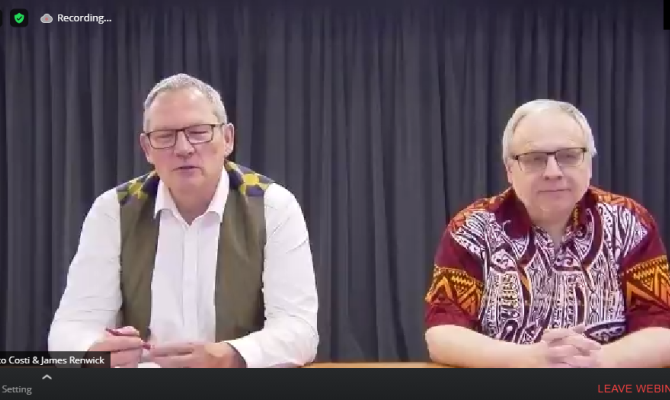
30 October 2020, Apia, Samoa – As the curtain fell on the 2020 Pacific Ocean, Pacific Climate Change conference (POPCCC), organisers asked of themselves, their participants, keynote speakers, and presenters, “What are the next steps we need to take from here?”
The third POPCCC was hosted by the Government of Samoa, in partnership with the National University of Samoa (NUS), Secretariat of the Pacific Regional Environment Programme (SPREP), and Te Herenga Waka—Victoria University of Wellington (VUW).
It was held over the course of four days, under the theme “Blue Pacific, Climate Action for Climate Resilience” and featured over 100 presentations and panel discussions about the science, the impacts, and the solutions to climate change in the Pacific.
SPREP’s Director General, Mr Kosi Latu, said, “Climate change is a multi-faceted issue, as well as a global issue, and it requires the action of everyone whether it be governments, international or regional organisations, non-governmental organisations to community groups, we need everyone to be a part of that process.”
“It is clear from the last four days that we need to keep up the momentum despite COVID-19. We cannot allow this pandemic to delay any further action on climate change —we need to continue to convey the message about the urgency of climate change.”
With the postponement of the 26th Conference of the Parties to the United Nations Framework Convention on Climate Change due to the pandemic, Mr Latu said it is not an excuse to backslide, but rather it creates an opportunity to continue the engagement that is required to progress the issue.
Mr Latu noted that next month will mark five years since the conclusion of the Paris Agreement, which was hailed as one of the most important agreements in terms of climate change.
“The Pacific played a critical role in reaching that agreement,” Mr Latu said. “We are now coming to five years since its conclusion, but we are not satisfied with the implementation of the goals of the Paris Agreement.”
He reiterated that it is very important that the Pacific maintains momentum and comes back to the negotiations table to complete the outstanding issues and effectively accelerate the implementation of those measures.
Professor James Renwick, Head of School of the School of Geography, Environment and Earth Sciences at Te Herenga Waka—Victoria University of Wellington mirrored Mr Latu’s statements around the need for urgency when it comes to climate change action.
“The science around climate change is very clear, and it’s obvious that climate change effects are happening across the Pacific and the world, and these will only get worse unless we take action as soon as we can,” Professor Renwick said.
“This decade is critical. The Paris Agreement drawn up 5 years ago has not seen emissions reducing in a systematic way across the world yet. We really need to work as hard as we can this decade to reduce emissions as much as we possibly can,” he added.
The Dean of the Faculty of Science at NUS, Tuifuisa’a Dr Patila Malua-Amosa, expressed what she perceived as one of the major important aspects of the conference—the research shared by the conference partners.
Tuifuisa’a said, “We have shared climate change research in the Pacific by Pacific researchers and our colleagues outside the region and have identified the importance of partnerships and collaboration, and for the region to work strategically together to drive our responses to the impacts of climate change and to retain our Blue Pacific environment.”
Tuifuisa’a also acknowledged the importance of including indigenous communities and their traditional knowledge in these explorations, as no one person or single entity has all the knowledge to adapt to or mitigate the impacts of climate change.
The capacity is there, as stated by Professor Alberto Costi of the Te Herenga Waka—Victoria University of Wellington Faculty of Law.
“What COVID-19 has shown is the capacity, when Governments have the will, to react quickly,” Professor Costi said.
“If Governments can so quickly call a State of Emergency as many have done for COVID-19, they could also display the same courage and declare a State of Climate Change Emergency,” he concluded.
The 2020 Pacific Ocean Pacific Climate Conference from 27 - 30 October 2020 is a partnership between the Government of Samoa, Secretariat of the Pacific Regional Environment Programme (SPREP), National University of Samoa (NUS), and Te Herenga Waka—Victoria University Wellington. The theme of this online conference is ‘Blue Pacific, Climate Action for Climate Resilience’. Further information can be found at https://pacificoceanclimatechange.org/
For more information and to arrange media interviews please contact:
• Te Herenga Waka—Victoria University of Wellington, Trudy Lagolago on (04) 463 9522 or by email at [email protected]
• Secretariat of the Pacific Regional Environment Programme (SPREP)—Leanne Moananu at (685) 21929 or [email protected]
• National University of Samoa—Sagapolutele Junior Jensen at [email protected]